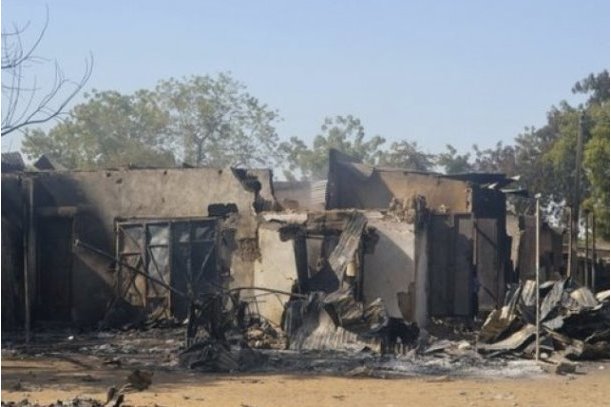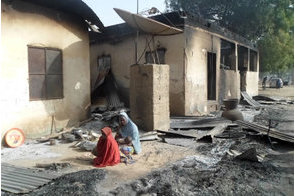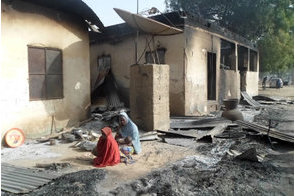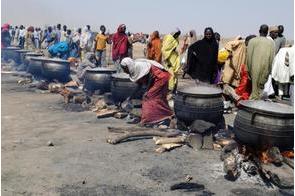Latest News
Nigeria ranks again as most terrorised country in Africa – GTI

News Highlight
The latest Global Terrorism Index report ranks Nigeria as the most terrorised African country for the fifth consecutive year.
Nigeria has been ranked as Africa’s most terrorised nation for the fifth consecutive year. The Global Terrorism Index (GTI) 2019 report released today by the Australia-based Institute for Economics and Peace (IEP) shows Nigeria is once again among the 10 most terrorised countries in the world.
The first and second most terrorised countries in the world, according to the GTI 2019, are Afghanistan and Iraq, respectively. Other countries most impacted by terrorism are Syria (4th), Pakistan (5th), Somalia (6th), India (7th), Yemen (8th), Philippines (9th), and Democratic Republic of the Congo (10th). The top 10 most terrorised countries in Africa in 2018 were Nigeria, Somalia, DRC, Egypt, Libya, Mali, Central African Republic (CAR), Cameroon, South Sudan, and Sudan.
The GTI, which ranks 163 countries, provides a comprehensive summary of the key global trends and patterns in terrorism over the last 18 years. The latest report shows that terrorism still remains a global security threat. 71 countries recorded at least one death due to terrorism last year. This is the second highest number of terrorised countries since 2002 – and four more than in 2017.
Four countries – Afghanistan, Nigeria, Mali and Mozambique – recorded substantial increases in deaths from terrorism last year, according to the GTI 2019. Afghanistan had the largest increase (59 per cent year-on-year) in deaths from terrorism in 2018.
Despite the data showing that terrorism is still widespread and increasing, the report shows the intensity of terrorism has declined. Deaths from terrorism decreased globally by 15.2 per cent in 2018 to 15,952, compared to 33,555 in 2014. This is the fourth consecutive year of improvement, according to the IEP report. The largest decreases took place in Iraq and Somalia due to the defeat of Islamic State of Iraq and the Levant (ISIL) in Iraq and US-led airstrikes on Al-Shabaab.
"IEP's research finds that conflict and state sponsored terror are the key causes of terrorism,” Steve Killelea, Executive Chairman of IEP, who explained that in 2018, over 95 per cent of deaths from terrorism occurred in countries that were already in conflict. “Of the 10 countries most impacted by terrorism, all were involved in at least one violent conflict last year."
The deadliest terrorist group in the world in 2018 was not ISIL, but the Taliban, which recorded a 71 per cent increase in terrorism deaths. The group was responsible for 38 per cent of all terrorist deaths globally last year.
The report also shows that the trend of female participation in terrorism has intensified over the past five years as the number of female suicide attacks increased by 450 per cent between 2013 and 2018. Boko Haram, the Islamic terrorist group in Nigeria, accounted for nearly 80 per cent of all female suicide attacks in the last five years.
The fall in terrorism, according to the new GTI report, has also been accompanied by a reduction in the global economic impact of terrorism, which has decreased by 38 per cent to $33 billion in 2018. IEP also said, compared to other forms of violence such as homicide, armed conflict, and military expenditure, terrorism accounts for a small percentage of the total global economic cost of violence, which was equal to $14.1 trillion in 2018.
Related News
Latest Blogs
- Between strong labour union and weak industry
- Nigeria and the International Oil Pollution Compensation Fund
- Prospects of Islamic finance in upscaling off‑grid renewable solutions in Nigeria
- Social outcomes as the tail that wags climate action
- The case for due process in aviation regulatory enforcement
Most Popular News
- NDIC pledges support towards financial system stability
- Artificial intelligence can help to reduce youth unemployment in Africa – ...
- Verod Capital exits Tangerine Pensions, sells stake to APT Securities
- Africa Finance Corporation closes record $1.5 billion syndicated loan
- New discovery offers hope against devastating groundnut disease
- AGOA expiry to impact African export diversification - UNCTAD








